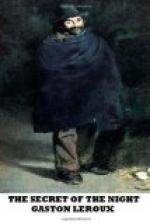“Are you mad!” shouted Koupriane.
“We are mad if we arrive like madmen. That would make the catastrophe sure. There is still a chance. If we wish not to lose it, then we must arrive easily and calmly, like friends who know the general is out of danger.”
“Our only chance is to arrive before the bogus doctors. Either they aren’t there, or it already is all over. Priemkof must have been surprised at the affair of the poisoning, but he has seized the opportunity; fortunately he couldn’t find his accomplices immediately.”
“Here is the datcha, anyway. In the name of heaven, tell your driver to stop the horses here. If the ‘doctors’ are already there it is we who shall have killed the general.”
“You are right.”
Koupriane moderated his excitement and that of his driver and horses, and the carriage stopped noiselessly, not far from the datcha. Ermolai came toward them.
“Priemkof?” faltered Koupriane.
“He has gone again, Excellency.”
“How — gone again?”
“Yes, but he has brought the doctors.”
Koupriane crushed Rouletabille’s wrist. The doctors were there!
“Madame Trebassof is better,” continued Ermolai, who understood nothing of their emotion. “The general is going to meet them and take them to his wife himself.”
“Where are they?”
“They are waiting in the drawing-room.”
“Oh, Excellency, keep cool, keep cool, and all is not lost,” implored the reporter.
Rouletabille and Koupriane slipped carefully into the garden. Ermolai followed them.
“There?” inquired Koupriane.
“There,” Ermolai replied.
From the corner where they were, and looking through the veranda, they could see the “doctors” as they waited.
They were seated in chairs side by side, in a corner of the drawing-room from where they could see every-thing in the room and a part of the garden, which they faced, and could hear everything. A window of the first-floor was open above their heads, so that they could hear any noise from there. They could not be surprised from any side, and they held every door in view. They were talking softly and tranquilly, looking straight before them. They appeared young. One had a pleasant face, pale but smiling, with rather long, curly hair; the other was more angular, with haughty bearing and grave face, an eagle nose and glasses. Both wore long black coats buttoned over their calm chests.
Koupriane and the reporter, followed by Ermolai, advanced with the greatest precaution across the lawn. Screened by the wooden steps leading to the veranda and by the vine-clad balustrade, they got near enough to hear them. Koupriane gave eager ear to the words of these two young men, who might have been so rich in the many years of life that naturally belonged to them, and who were about to die so horrible a death in destroying all about them. They spoke of what time it was, of the softness of the night and the beauty of the sky; they spoke of the shadows under the birch-trees, of the gulf shining in the late evening’s fading golden light, of the river’s freshness and the sweetness of springtime in the North. That is what they talked about. Koupriane murmured, “The assassins!”




